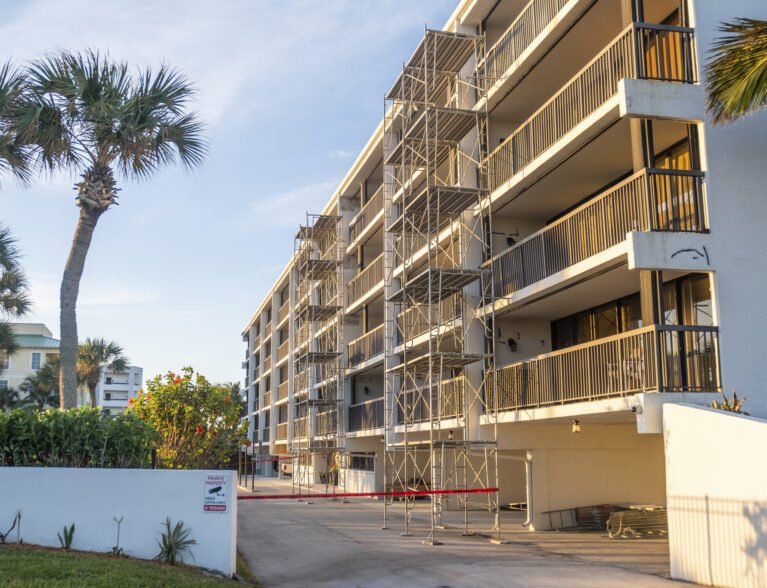
Virtually all of the local multi-story buildings that have already filed their newly required inspection reports have proven to be safe, but some homeowners associations (HOAs) say the process mandated by the law unfairly penalizes condo and co-op owners and may even threaten some with loss of their homes because of crushing added costs.
In the wake of the 2021 collapse of the Surfside condominium in South Florida that killed 98 people, the Florida Legislature passed a law requiring all multi-story buildings 30 years or older – and all buildings 25 years or older within 3 miles of a saltwater shoreline – to complete milestone inspections by professional engineers or architects, the so-called Structural Integrity Reserve Studies (SIRS), by Dec. 31 of this year.
In Indian River Shores, 29 buildings that are condominiums or co-ops fall under the new law, and its Building Division is in the process of receiving the milestone inspection reports. Of those 29 buildings, 19 of them had submitted their milestone inspection reports the week before Christmas, according to Fred Held of the town’s building department.
Although no immediate dangers of imminent collapse requiring evacuation have been uncovered, some buildings have been referred for a Phase 2 inspection requiring further details on needed repairs. Those buildings supposedly have a six-month time window to make a plan how to carry out the needed repairs and then a year to implement the plan, even if those findings “did not indicate any substantial structural deterioration.”
Another report noted the need for “concrete restoration and guard rails,” but Held said an active permit was already on file for the guardrail repair or replacement, so repairs are in process.
Vero Beach has deferred to the Indian River County Building Division for administering the milestone inspections process, and the county says it has so far received 49 milestone inspection reports for 67 buildings either in the city or outside city limits that fall under the law.
None of those reports filed so far indicate the need for a Phase 2 inspection to address serious structural deficiencies. However, it seems likely problem-free reports would be filed first.
The county also said that in both jurisdictions, a total of 97 newer condo buildings did not require milestone inspections because they were built after the year 2000, or because they were built in the previous five years but are more than 3 miles from the beach.
The deputy head of the county Building Services division, Anthony Warren, also noted that the state registry of buildings is not complete and that some HOAs have not registered with the state, as required by the law. At present it is not clear what mechanisms exist to make those HOAs comply.
The new law – which mandates that HOA boards provide enough funds in their reserves budgets to carry out needed repairs by the recommended completion dates – is intended to prevent HOAs from “kicking the can down the road,” as happened many times in the past, specifically in the Surfside collapse, where residents were trying to keep current maintenance costs to a minimum.
If individual condo owners refuse to vote for fully funded reserves, the HOA boards are obligated to impose their own budgets for fully funded reserves anyway. Fully funded reserves means that if a new roof costs $700,000 and it will be needed in 7 years, the building must put aside $100,000 in each of the next 7 years to make sure there will be enough money to pay for the repairs by the time they are needed.
Mark Shea, the president of the HOA at the Robles del Mar condominium complex on Highway A1A in Indian River Shores, says that although the new law was well-intended, some aspects of it have had unforeseen consequences and are now unnecessarily driving up costs.
This will force HOAs to slap giant assessments on individual unit owners, increase monthly maintenance fees or take out sizeable loans – or resort to a combination of all of the above, he says.
The full effects of the bureaucratic processes to get into compliance with the law will not be known for some time, Shea says, and local and state authorities have so far shown they are “ill-prepared to deal with some the questions raised by the process.”
The looming condo crisis may affect real estate prices all across the state, force retirees living on fixed incomes to sell their homes and perhaps move elsewhere, Shea speculates.
“Arizona may have a 2.5 percent state income tax while in Florida we have none,” Shea explains, “but they have no hurricanes and no insurance crisis like we do. Those things more than make up for a small state income tax. We have to realize we’re competing against other states with 12 months of sunshine.”
Shea has written to the Vero Beach Association of Realtors to ask for their support in trying to get relief from some of the most onerous provisions of the new law.
Shea is a founding member of the Treasure Coast Condominium Alliance (TCCA), which so far includes HOAs from close to 20 buildings stretching from Indian River Shores in the north to Stuart in the south. Leaders of the alliance, which has hired a Tallahassee lobbyist, Travis Moore, met earlier this month in Boca Raton in South Florida with two Florida state legislators, state Rep. Vicki Lopez and state Sen. Jennifer Bradley, to urge legislative action to help ease the burdens on HOAs.
Shea said the legislators promised to pursue amendments to the law during committee meetings in January, for presentation to the full legislature at its Spring session.
Specifically, the alliance has asked for an appeals process – at present there is none under the law – against “totally subjective,” unilateral and arbitrary inspection reports imposing unnecessary costs, the right for HOAs to obtain a second opinion, and more time to fund needed repairs.



